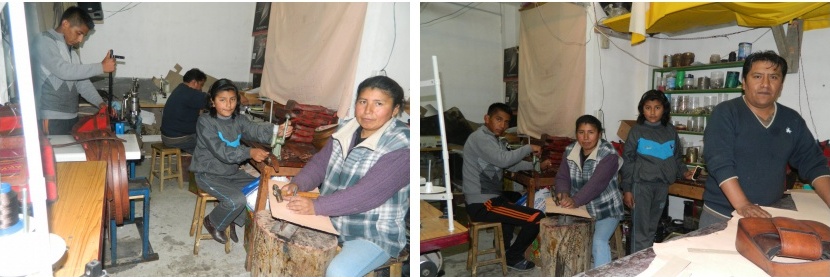
Company name: Juan Carlos Mamani
Specialty: leatherwork
Technique: Leather sewing machine, handwork
Place: La Paz, Bolivia
Type of business: Juan Carlos Mamani and his wife hire 5 young people as assistants, depending on the number of orders.
Foundation: 1996
Products for Caserita.com: Bolivian leather handbags, backpacks, briefcases
The “Plus”:
- Decades of experience
- Commitment to the issue of social responsibility
- Flexibility
How they work: Juan Carlos and his brother create and make the patterns; all the employees may perform all tasks if they are able and interested, but some prefer simple, monotonous jobs.
Company origin
While he was a student, Juan Carlos Mamani worked in a leather workshop making handbags. He learned a lot about working with leather, and after he finished high school in 1996, together with his brother, he decided to invest in his own workshop. The brothers bought equipment and tools to use while working from their parents' home. The first product Juan Carlos made was a handbag for a friend's birthday. He took his product to the tourist street in downtown La Paz to promote his workshop and to show to different shop owners. One of the latter took a chance and bought the bag for a good price. "I didn't have a gift for my friend, but I had the money," he says with an impish smile.
Production grew slowly until Juan Carlos decided to get married. Now the deal the Mamani brothers made from the beginning went into effect: The one who continued to live in their parents' home would keep the workshop and the tools.
Juan Carlos and his wife moved to the other side of the city and borrowed US$ 2,000 from the bank. For three months they supported themselves without work until they decided to buy a sewing machine. Unfortunately, there was only enough money to buy one fabric sewing machine. For three more months, Juan Carlos changed it slowly into a leather sewing machine. Then the couple returned to working in leather. Since they still did not have machines to treat leather, Juan Carlos bought an old motorcycle for US$ 300 to go to his brother's workshop across town.

Company founding
In the end, the couple managed to buy their own tools in 2002 and set up a small workshop in their neighborhood. Since this part of La Paz is not very well connected to downtown, mainly poor people populate it. Many families do not have land or their own house, but live in rentals. Often homeowners do not want children in the houses, so parents send their children out to play in the streets. Teenagers get bored, and when they heard about Juan Carlos' new workshop, some of them came looking for work.
Since then, Juan Carlos and his wife regularly hire 4 to 5 young men, depending on the number of orders they have. The boys are between 14 and 17 years of age, and work part time to pay for school or support their parents. Most of them prefer simple, monotonous work. However, some of them are more interested in working with leather and learn the entire process to produce a handbag or backpack. Juan Carlos teaches them everything, and then he pays them per piece instead of by the hour. The worker can earn four times the minimum wage in Bolivia this way.
Juan Carlos especially remembers one boy who learned so quickly and worked so precisely that he and his wife feared they might have created future competition. But the young man got married and invested in a minibus (a common form of public transport in La Paz). Now he works as a driver. On the one hand Juan Carlos is sad to see the waste of this boy's exceptional talent, but obviously he is happy with less responsibility.
Future prospects
The couple lives well and supports their two children with the earnings from their small workshop. To cover the slow season at year end, they also run an Internet café in their neighborhood. Their big dream is to buy land in the city of El Alto to build a factory for leather accessories with 50 employees.
Caserita.com is proud to be one of Juan Carlos Mamani's few customers. The couple provides us with high quality products and provides opportunities for the young men in their neighborhood.


